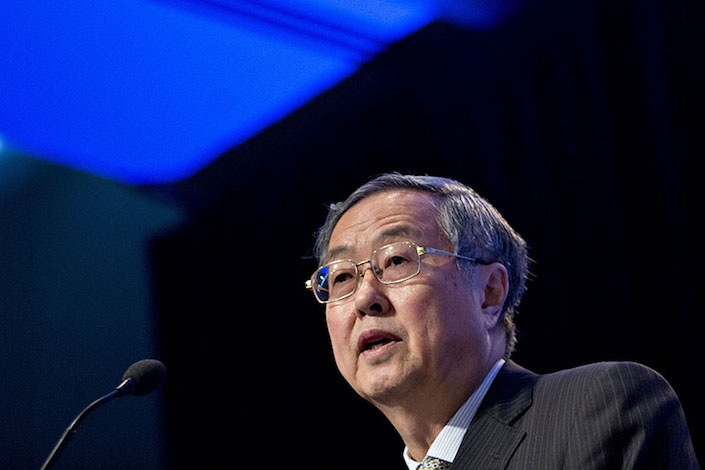China’s Companies Need More Transparency, Former Central Banker Says

China needs to improve transparency, accounting standards and governance of listed companies and financial markets as more businesses seek to move their listings to the home market amid growing regulatory pressures abroad, Zhou Xiaochuan, the country’s former central bank governor, said Thursday.
China’s domestic market is capable of hosting more companies as an alternative listing destination outside the United States, Zhou said in a video speech delivered to the Lujiazui Forum of top financial regulators in Shanghai. But there are still uncertainties over whether China’s financial hub Shanghai can take the opportunity to strengthen its status in global capital markets, Zhou said.
There have been mounting concerns among Chinese companies listed in the U.S. after the Senate overwhelmingly approved legislation in May that could force Chinese companies to delist from American stock markets if they don’t comply with certain financial transparency requirements. To become law, the measure must pass the House of Representatives and be signed by the president.
The measure has prompted leading U.S.-listed Chinese companies including e-commerce giant JD.com Inc. and online game company NetEase Inc. to initiate secondary listings in Hong Kong. Yum China, operator of KFC and Pizza Hut restaurants in China, is expected to follow suit.
The U.S. legislation followed a series of clashes between Beijing and Washington on economic and political issues and reflected growing frustration of American regulators and investors after the multimillion-dollar accounting fraud of China’s Luckin Coffee Inc.
Such scandals plaguing Chinese companies reflect a gap between Chinese accounting practices and international standards, Zhou said.
“Some people defended the lack of transparency with national security concerns, which I can’t agree with,” the former central banker said.
Chinese companies fall short in corporate governance based on common standards adopted by major economies and need to “take great efforts to make others understand and accept our practices,” Zhou said.
China has great willingness to open its economy and empower Shanghai’s status in global financial markets, but more determination and efforts to push forward reforms are needed, he said.
China’s high saving rate means the domestic market is capable in term of capital access of hosting more domestic listings, Zhou said. The country’s capital market has come a long way and still has a strong impetus to continue restructuring, he said. The market will also benefit from increasing openness of the economy and growing influence of the Chinese currency.
Despite the recent scandals, there are plenty of Chinese companies of high quality, and companies and regulators are willing to push forward further changes, Zhou said.
The proposed U.S. legislation on foreign company listings may provide an opportunity for Shanghai to elevate its status as an international financial hub, but to reach the goal, more policy measures will be needed to enhance international cooperation and comply with international standards, Zhou said.
The U.S Senate legislation would ban any company from being listed on any U.S. securities exchange if the Public Company Accounting Oversight Board (PCAOB), an auditing regulator, is unable to inspect the auditor that prepares the company’s financial reports for three years in a row. Although it applies to all foreign companies, the bill is clearly targeted at China.
U.S. regulators have long complained about the complex approval procedure to access audits of Chinese companies. A China policy in 2009 restricted overseas regulators’ ability to supervise auditors based in China, requiring any foreign watchdog that wants to conduct an onsite inspection of a Chinese company to first seek approval from relevant authorities.
If the Senate bill becomes law, it could threaten the listings of nearly 250 Chinese mainland- and Hong Kong-based companies whose shares are traded in the U.S. and whose auditors are under China’s jurisdiction, according to the latest PCAOB review.
At the same Shanghai forum where Zhou spoke, Fang Xinghai, vice chairman of the China Securities Regulatory Commission (CSRC), said Chinese regulators have long been open to discussion and hope to work out a solution with their American counterparts.
The CSRC wants to resolve the problem through supervisory cooperation and believes there will be a solution, Fang said. Chinese companies’ listings in the U.S. bring benefits to both countries, he said.
Fang’s comment echoed CSRC Chief Yi Huiman. In an exclusive interview with Caixin Thursday, Yi said China has never banned or stopped Chinese companies from providing audit working papers to overseas regulators.
“As long as the U.S. side is truly willing to solve the problem, we can definitely find a way for China and the U.S to cooperate on audit regulation,” Yi said in the interview.
Lin Jinbing, Tang Ziyi and Timmy Shen contributed to this story.
Contact reporter Han Wei (weihan@caixin.com) and editor Bob Simison (bobsimison@caixin.com)
Caixin Global has launched Caixin CEIC Mobile, the mobile-only version of its world-class macroeconomic data platform.
If you’re using the Caixin app, please click here. If you haven’t downloaded the app, please click here.

- PODCAST
- MOST POPULAR




